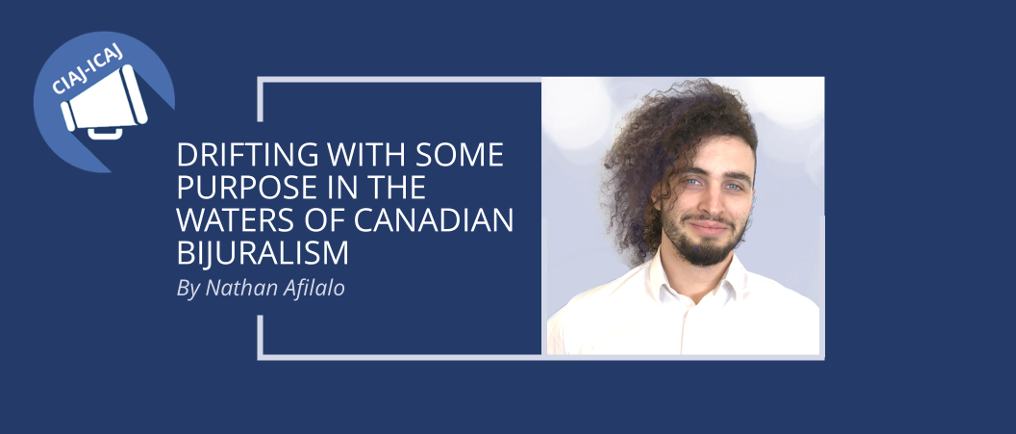Drifting With Some Purpose in the Waters of Canadian Bijuralism

Nathan Afilalo, you are bilingual and have studied both Civil Law and Common Law at McGill University. You have just been called to the Ontario Bar and are preparing for your Quebec Bar exam. You seem to be the perfect example of Canadian bijuralism! What made you choose this specific path?
I first applied to law school in the hope of graduating with a better understanding of the relationship between the Canadian justice system and Indigenous Peoples. In retrospect, law school was not the ideal vehicle for such an enterprise. However, as I had studied issues in cross-cultural interpretation at Concordia University’s Department of Religion and Cultures, I thought that a legal education would be an avenue to put into practice what I had learnt. As the JD/JID program at the University of Victoria did not exist, the transsystemic program at McGill seemed to be the strongest option at the time.
Further, because I grew up in Montreal, bilingualism or bijuralism did not seem like such a strange idea. However, my initial expectation of law school was to emerge with a tri-legalism, which would include fluency with Indigenous legal systems and traditions alongside the Civil and Common law traditions. Unfortunately it seems that it took the TRC Calls to Action to awaken law schools (and they slowly) to the necessity of such a legal education for law students and not the raw history and continuity of colonialism.
What is the greatest challenge you have faced along the way?
A few things, and they are familiar to most. The first is time, the second is cost, and the third is endurance or hope. That studying for any bar exam requires dedication is no secret. Studying for multiple exams simply means being more aware of which process is more flexible, which has strict time requirements, and how you can navigate between the two. One also has to be mindful of the possibility of retaking an exam and the additional time that adds. For any aspiring lawyers, it might be more strategic to do the Quebec process first as the process is much more flexible.
Cost is also a factor that for me had to be taken into account. Each process has its trove of fees. Further, the time taken to study can often mean time is lost earning an income. Those who do not work during or have their way paid through school and bar examination processes have more flexibility. Therefore some additional planning is required for those who work. The bright side is that if you had a tougher time because of work, you have a better story to tell at the end of the road as more formidable dragons were slain.
Because of the toil that the costs and time requirements might exact, maintaining hope in the whole enterprise might be difficult. It was for me. However, the truth of the matter is that one’s plans are often thwarted, and we must change in order to overcome the obstacles that bar our path. To do that, I had to accept that I might indeed fail entirely, and be OK with that. However, with that acceptance comes an appreciation for the process regardless of the result, and it seems that it is often when we become detached from our desperation for the end result that the result is finally achieved.
When you chose to study law, were you thinking of pursuing a career as a pleader?
No I did not. I did not ever plan on becoming a lawyer. But the entire process of law school is very good at inculcating you with its idea of what should be done with a legal education. However, once done with the whole affair, you find yourself equipped with tools to help people with their legal issues.
You are currently an articling student at the Canadian Institute for the Administration of Justice. What is the nature of your work?
My job at CIAJ is very much like that of other articling students. I have to research case law, write legal briefs and memos and produce a high-quality product for the client. However, I was also given the opportunity to work with a judge for a week at the Superior Court, orchestrate and plan legal education curriculums, and research my own interests that I could bring forward to the organization and pursue.
While I cannot say anything as to the sagacity of beginning one’s legal career with an alternative path, it certainly has been an eye opening as you can see all the different avenues that can be taken. The path of the large firm is not the only one. The trick is to have a discussion with yourself, understand your wants and capacities, and try to come up with a path that you are happy to follow.
Today, what is your main motivation for pursuing a career in law? Has this changed since you began your studies?
It will sound naive, but fundamentally it is to help people in need. While law is always subject to change, the necessity to aid others is not. If I can promote the vague project of human flourishing by genuinely providing people with the help required to navigate and reconcile their legal issues, I will be able to meet my inevitable end with a little less sadness. This purpose was the reason I first studied law and has not changed since. My goal now is to find the avenues to best effectuate that goal with the little talents I have been given and able to cultivate.
What else would you have liked to do if you had not become a lawyer?
Always a dangerous question. I most likely would have continued graduate studies in religion and philosophy. And who knows, I may pursue that at a later point. What is nice about law is that it allows you to dive into new pools or back into old ones with a new perspective.
If you had only one piece of advice for students thinking about a career in the field, what would it be?
To try and learn to manage one’s stress. It is certainly something that I am trying to control. Sadly, it is well documented that stress, anxiety and other mental health issues follow many lawyers. Beginning on the long road of learning to manage one’s mental health issues early on can only help law students and future lawyers enjoy their chosen vocation rather than endure it. With that said, law students should recognize that law schools reproduce harmful norms present in the profession and that change needs to come from legal institutions to alleviate this problem, and it is not the burden of students to do alone.
Now while all that sounds terribly serious, law students in my humble opinion would do well to be less so (serious that is). Interests outside of law, be they frivolous or continuations of years dedication, are certainly excellent ways to maintain one’s mental health. While professors may tell us that everything is and contains law, law is not everything.

